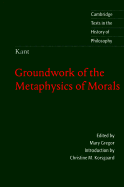Book contents
- Frontmatter
- Contents
- Introduction
- Chronology
- Further reading
- Groundwork of the Metaphysics of Morals
- Preface
- Section I Transition from common rational to philosophic moral cognition
- Section II Transition from popular moral philosophy to metaphysics of morals
- Section III Transition from metaphysics of morals to the critique of pure practical reason
- Notes
- Selected glossary
- Index
- Title in the series
Section I - Transition from common rational to philosophic moral cognition
- Frontmatter
- Contents
- Introduction
- Chronology
- Further reading
- Groundwork of the Metaphysics of Morals
- Preface
- Section I Transition from common rational to philosophic moral cognition
- Section II Transition from popular moral philosophy to metaphysics of morals
- Section III Transition from metaphysics of morals to the critique of pure practical reason
- Notes
- Selected glossary
- Index
- Title in the series
Summary
It is impossible to think of anything at all in the world, or indeed even beyond it, that could be considered good without limitation except a good will. Understanding, wit, judgment and the like, whatever such talents of mind may be called, or courage, resolution, and perseverance in one's plans, as qualities of temperament, are undoubtedly good and desirable for many purposes, but they can also be extremely evil and harmful if the will which is to make use of these gifts of nature, and whose distinctive constitution is therefore called character, is not good. It is the same with gifts of fortune. Power, riches, honor, even health and that complete wellbeing and satisfaction with one's condition called happiness, produce boldness and thereby often arrogance as well unless a good will is present which corrects the influence of these on the mind and, in so doing, also corrects the whole principle of action and brings it into conformity with universal ends – not to mention that an impartial rational spectator can take no delight in seeing the uninterrupted prosperity of a being graced with no feature of a pure and good will, so that a good will seems to constitute the indispensable condition even of worthiness to be happy.
Some qualities are even conducive to this good will itself and can make its work much easier; despite this, however, they have no inner unconditional worth but always presuppose a good will, which limits the esteem one otherwise rightly has for them and does not permit their being taken as absolutely good.
- Type
- Chapter
- Information
- Kant: Groundwork of the Metaphysics of Morals , pp. 7 - 18Publisher: Cambridge University PressPrint publication year: 1998



